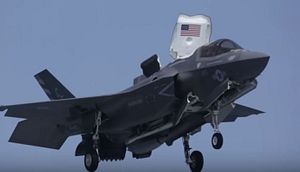A F-35B, the U.S. Marine Corps’ short take-off and vertical landing (STOVL) variant of the supersonic fifth-generation F-35B Lightning II Joint Strike Fighter, has conducted its first-ever strike in Afghanistan on September 27.
Yesterday’s strike marks the combat debut of the F-35B as a close-support aircraft. According to CNN, the target was a “fixed Taliban” position. “During this mission, the F-35B conducted an air strike in support of ground clearance operations, and the strike was deemed successful by the ground force commander,” U.S. Central Command (CENTCOM) said in a statement.
CENTCOM neither revealed the exact number of aircraft involved in the strike nor the munitions used, although a video released by the U.S. military shows what appears to be a satellite-guided 1,000-pound Guided Bomb Unit-32 (GBU-32) Joint Direct Attack Munition (JDAM) weapon fitted on an external weapon pod of the aircraft.
Interestingly in the video the F-35B also appears to be carrying an extra fuel tank, which would compromise the stealth capabilities of the aircraft. Given the non-existent Taliban anti-aircraft threat, however, this is not an unusual move given the mission perimeters. Notably, the F-35B has been specifically designed to evade detection via radar and penetrate enemy airspace permeated by anti-access/aerial denial systems.
The video also shows the F-35B aircraft taking off from the Wasp-class amphibious assault ship USS Essex presumably cruising somewhere in the Arabian Sea. The Essex Amphibious Ready Group (ARG) consisting of the USS Essex, the San Antonio-class amphibious transport dock USS Anchorage, and the Whidbey Island-class dock landing ship USS Rushmore deployed to the Western Pacific and Middle East in July.
It is the first U.S. Navy flattop to carry a squadron of operationally deployed F-35Bs. As I reported in July:
The 40,000-ton USS Essex can carry around 31 aircraft, including F-35Bs, AV-8B Harrier IIs, MH-60S Knighthawk helicopters, AH-1Z Viper helicopters, and MV-22 Osprey tiltrotor aircraft. It can also embark around 2,300 assault troops and support equipment. Following modifications to its flight deck, the Essex can carry up to six F-35Bs.
F-35Bs also temporarily deployed aboard the lead ship of the Wasp-class USS-Wasp in March. The USMC declared the F-35B operational in 2015 becoming the first service to do so. The F-35B is part of Marine Fighter Attack Squadron 211 assigned to the 13th Marine Expeditionary Unit (MEU), the first combat-deployed MEU to replace the AV-8B Harrier with the F- 35B.
“The F-35B is a significant enhancement in theater amphibious and air warfighting capability, operational flexibility, and tactical supremacy,” said Vice Admiral Scott Stearney, commander, U.S. Naval Forces CENTCOM. “As part of the Essex Amphibious Ready Group, this platform supports operations on the ground from international waters, all while enabling maritime superiority that enhances stability and security.”
While the September 27 mission marks the first combat mission of a U.S. F-35 stealth fighter, Israel has already used the aircraft for airstrikes in the Middle East earlier this year.

































